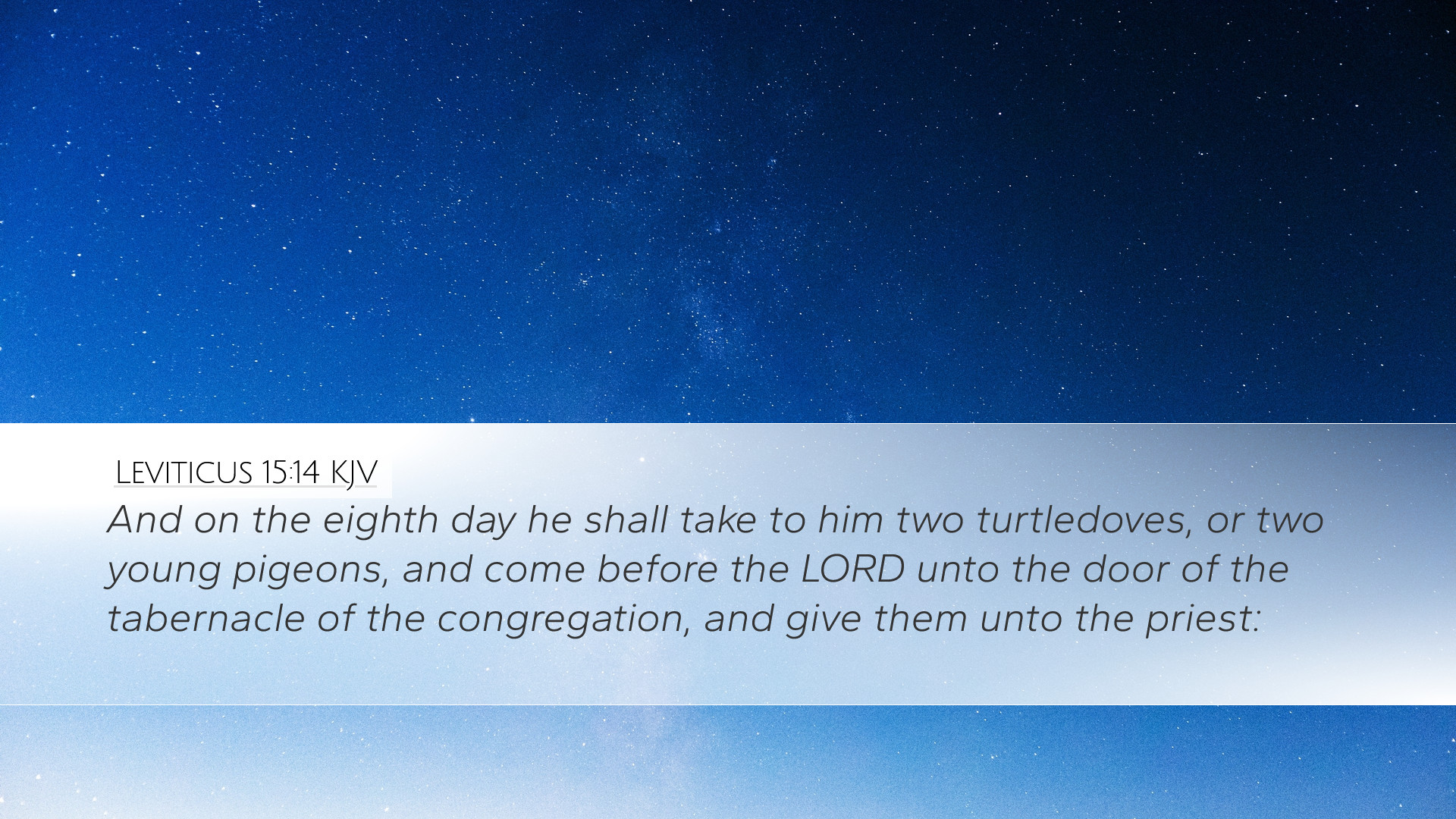Commentary on Leviticus 15:14
Leviticus 15:14 states:
“And on the eighth day he shall take for himself two turtledoves or two young pigeons, and come before the Lord to the door of the tabernacle of meeting, and give them to the priest.”
Introduction
The passage from Leviticus 15:14 is situated within the framework of laws addressing bodily discharges, emphasizing purity regulations for the Israelites. This verse specifically outlines the requirements for purification following a specific period and serves as a reminder of the sanctity of approaching God in worship.
Insights from Matthew Henry
Matthew Henry offers profound insights into this regulation regarding purification. He highlights the importance of ritual cleanliness:
- Symbolism of Cleanliness: For Henry, the requirement for the individual to bring offerings after a period of uncleanness symbolizes the need for spiritual renewal and restoration before God.
- Active Role of the Priest: He emphasizes the role of the priest as a mediator, underscoring the truth that access to God is through a divinely appointed means.
- Obedience and Worship: Moreover, Henry notes that the act of obedience in bringing offerings signifies humility and readiness to restore relationships—not only vertically with God but horizontally with the community.
Insights from Albert Barnes
Albert Barnes provides a detailed exploration of Leviticus 15:14, focusing on the cultural and religious implications of the offerings:
- Types of Offerings: Barnes observes that the use of turtledoves or young pigeons signifies accessibility; these were commonly owned birds, implying that even the poorest in society could fulfill the requirement of offering.
- Day of Presentation: The requirement of presenting this offering on the eighth day reflects the biblical principle of completion and new beginnings, correlating with the significance of the number eight in Scripture.
- Tabernacle as Meeting Place: The concept of coming before the Lord at the door of the tabernacle emphasizes the significance of designated places for worship and the need for ritual in approaching God.
Insights from Adam Clarke
Adam Clarke offers contextual elucidation about the ritual laid out in Leviticus 15:14:
- Cultural Context: Clarke underscores the cultural implications of the ritual, noting how these regulations were ingrained in the socioreligious life of the Israelites, generating a strong sense of community and identity.
- Spiritual Application: He stresses the spiritual application of this purification rite, encouraging believers of all times to reflect on their spiritual state and the need for cleansing through Christ.
- Teachings on Forgiveness: Clarke connects this purification to Christ's teaching on forgiveness—underscoring that forgiveness is given for those who seek restoration sincerely.
Theological Significance
The theological significance of Leviticus 15:14 extends beyond its ceremonial implications and into the greater narrative of Scripture:
- Christ's Fulfillment: Many theologians see Christ as the ultimate fulfillment of these Old Testament laws. His acts of grace and mercy represent the truest form of cleansing the heart and soul.
- Community and Holiness: The impact of personal cleanliness on community holiness is a recurrent theme. Each individual’s approach to God affects not just their relationship with Him but also the corporate identity of His people.
- Preparation for Worship: This verse illustrates the necessary preparation and heart posture prior to engaging in worship. As believers approach God, they must be mindful of their spiritual hygiene and communal responsibilities.
Practical Applications
From Leviticus 15:14, several practical applications emerge for modern believers:
- Preparation for Worship: Believers are encouraged to prepare their hearts and minds before worship, ensuring they seek reconciliation where necessary and approach God with reverence.
- Accessibility of Worship: The requirement for turtledoves or pigeons serves as a reminder that worship is accessible to all, irrespective of one's social status or wealth.
- Community Responsibility: This passage emphasizes the responsibility of the community in supporting one another toward holiness, urging believers to encourage and help restore each other in faith.
Conclusion
In conclusion, Leviticus 15:14 serves as a poignant reminder of the need for purification in approaching God. The combined insights from various biblical commentators highlight the importance of ritual in both ancient and modern contexts, emphasizing God's desire for a holy people and the continual necessity of reconciliation in the community. This passage richly informs pastors, students, theologians, and believers of all backgrounds about the profound depth of God's law and His overarching grace through Christ.


